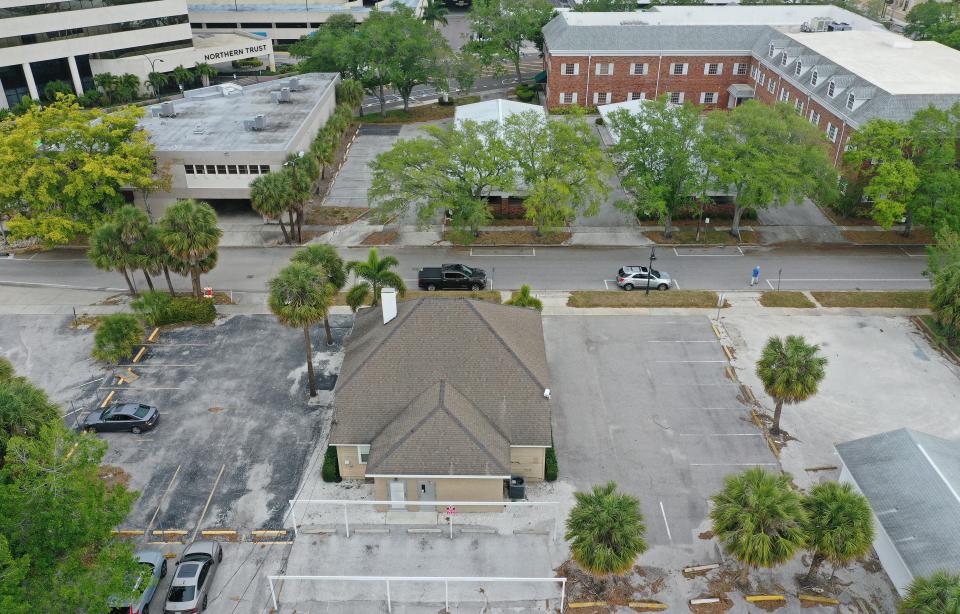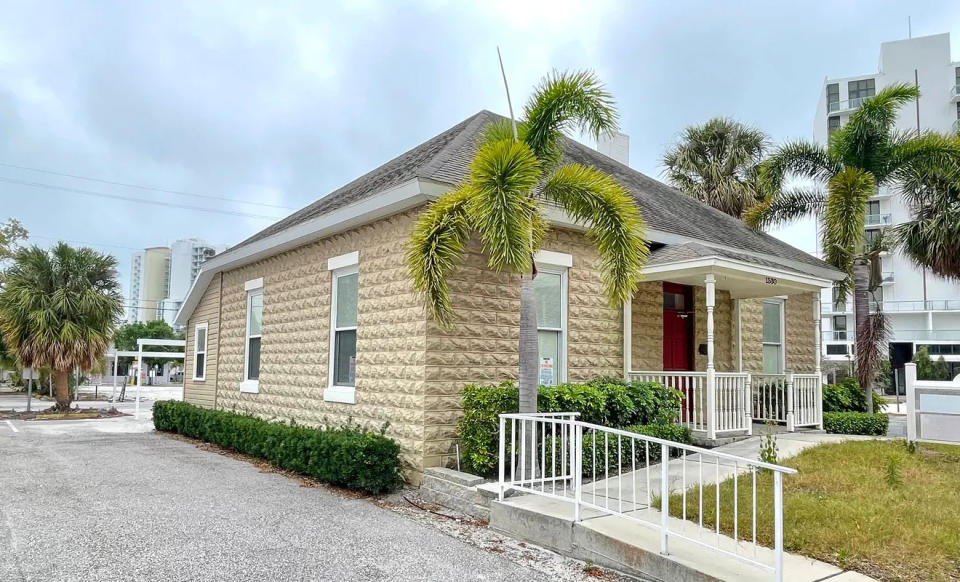Sarasota OKs demolition of 112-year-old historic house to make way for new development
A year-long back-and-forth on the fate of a notable downtown building boiled down to one question in Monday’s Sarasota City Commission meeting: How historic is historic enough?
The legacy of concrete tycoon George McAlpin stood at the center of the debate. At 112 years old and with original architecture from the time it was built, his house at 1530 Cross St. commissioners agreed, is a significant stamp on the local timeline.
The McAlpin House: Sarasota developers push to demolish historic house while advocates fight to save it
But how significant? How historic? Enough to locally designate the house in 1985, but enough to pull out all the stops to preserve it when a developer seeks to put a new project in its place?
Generally accepted criteria of a historic place include proof that the structure designates a notable person or event, contributes to the surrounding ambiance, is rare in its makeup or design and is difficult to replicate. At Monday’s meeting, Commissioner Erik Arroyo argued that McAlpin — the person and the place — didn’t fit the bill.
“McAlpin is just not someone that you study,” Arroyo said. “We need to be a little bit more discerning on what constitutes a historic building”
Vice Mayor Jen Ahearn-Koch, however, insisted the opposite.
“Just because we haven’t heard of it doesn’t mean he’s not well-known in our city,” Ahearn-Koch said.
The question at large still lingers, but next steps for the McAlpin House are finally clear after a lengthy period of uncertainty.

The commission voted 3-2 to approve developer Orange Pineapple LLC’s request to demolish the McAlpin House, a historic home located at 1530 Cross St, with stipulations. The discussion was continued from an April 1 meeting that left the commission at a standstill.
The Virginia-based developer first made the demolition request to clear the way for a mixed-use development across more than 3 acres along Cross Street last May. The Sarasota Historic Preservation Board unanimously denied the request the following July, and Orange Pineapple subsequently appealed the decision to the city commission.
The commission paused on a decision at an October 2023 meeting, where it instead instructed the developer to shop around for potential relocation sites and reconvene six months later. At the subsequent April 1 meeting, Orange Pineapple reported they couldn’t procure a guaranteed relocation site or someone willing to take on the house. Commissioners ran out of time before they could make a motion and tabled the discussion until Monday’s meeting.
Continued pauses: Sarasota City Commission can't decide if developer can demolish historic home
Though moving the house to another location would be ideal, Patrick Seidensticker, the attorney representing Orange Pineapple, said cultivating local interest has been a challenge. Whichever person or organization claims responsibility for the house would have to provide a viable site for the 1,600-square-foot structure and ensure its upkeep, he said.
“Obviously those are a lot of hurdles to move the structure,” Seidensticker said. “You have to have a receiver.”
Orange Pineapple presented three preservation options to the commission: The new structure could incorporate part of the original design and a replication of the house’s signature rusticated blocks as a corner façade, a third party could move the house to Pioneer Park or the developer could fund a $200,000 endowment that the commission could allocate toward a historic preservation project of its choice. The developer will give the house to willing owners for free and cover the costs to move it to its new location if a third party volunteers to take it on.
Local moving company Johnson Housemovers has confirmed it’s willing to move the house for an estimated $200,000. Pioneer Park — where the historic Bidwell-Wood House, Crocker Memorial Church and Pioneer Whitaker Cemetery now reside — was lauded as a prime site for relocation, and the Historical Society of Sarasota County has expressed interest in owning the house.
Approval of the demolition permit, Seidensticker said, would allow Orange Pineapple to move forward with a site plan. The developer maintained it wouldn’t demolish the structure until the site plan is fully approved — which could take months, if not years — and would continue to pursue the Pioneer Park relocation in the meantime.
More: Sarasota elected officials reject County Commission rules on United Way donations
But opponents were reluctant to support the demolition approval, even if the developer secures a relocation site and the McAlpin House remains intact. The alternatives of a $200,000 endowment or a replicated corner façade, they argued, weren’t enough to preserve the history of the building and its owner.
Though Orange Pineapple hasn’t submitted an official site plan, its $32-million purchase affords it a significant swath of Cross Street. Its preservation efforts are especially minimal what it will gain, opponents of the demolition like Clifford Smith, a senior planner for the city of Sarasota, said.
“They’re asking the city to vacate Cross Street, which is a huge amount of land,” Smith said. “They’re getting so much more of an ask than they’re willing to give.”
Remnants of the building as a façade, Smith said, would create a “false sense of history” that would pale in comparison to leaving the building intact and on site. Though he acknowledged the development of the surrounding parcels was imminent, Smith insisted letting the building remain was the easiest, safest and most cost-effective option to preserve the history.
The commission was still at a crossroads after presentations and public comment. While some felt Orange Pineapple had exhausted every preservation option and should be granted the permit to move forward, others felt there was still more the developer could do to safeguard the McAlpin House and its history.
Commissioner Debbie Trice, who voted against approving the demolition, said the $200,000 Orange Pineapple pledged to allocate toward moving costs or a preservation endowment didn’t account both the value of the house itself and the revenue the new project would secure with or without the house’s absence.
Trice also worried that a demolition permit would remove the pressure on developers to preserve the house.
“If we give you permission to demolish, you no longer have an incentive to work out the details,” Trice said. “I’m not eager to give you carte blanche.”

Ahearn-Koch, the other dissenting vote, argued that demolition wasn’t necessary for Orange Pineapple to build its project. The building, which has been vacant for the last decade but was used as office space in the past, could be incorporated into the project as an office or small business, Ahearn-Koch said.
In a downtown core zoning district that allows for 10 stories of building height and is experiencing a steady climb toward modern, mixed-use projects, Seidensticker argued the relatively small McAlpin House wouldn’t prove an asset to Orange Pineapple’s development and would be more appropriate off the site.
“Unfortunately, the way the zoning is, it’s going to be surrounded by 10-story buildings,” Seidensticker said. “I just don’t think that’s the best thing for the McAlpin House.
But the argument wasn’t compelling enough to convince Ahearn-Koch to approve the demolition. Despite its aspirations, the burden of development was still the developer’s to bear, Ahearn-Koch said — even if it interfered with an ideal site plan.
“You knew it was historic when you purchased it. You knew there were limitations on it,” Ahearn-Koch said. “You don’t just get to dream of the highest and best use.”
Supporters of approving the permit contented that Orange Pineapple did bear that burden. With extensive preservation efforts to little avail, some commissioners conceded that permit approval was necessary to move forward and prevent indefinite continuance.
Commissioner Kyle Battie, who toured the building, questioned whether the efforts exceeded the McAlpin House’s worth. With only three of the original walls intact and a name adjacent to Sarasota’s more notable founders like Owen Burns, Battie said the payoff of withholding a demolition permit to continue exploring preservation could be more of a drain on resources than it permits.
“On my 56 years on this Earth or whatnot and growing up in this city, no one has ever mentioned George McAlpin,” Battie said. “This kind of gives me pause when we’re doing this to preserve four walls, or three walls, or two-and-a-half walls.”
More: Two new candidates file for Venice Council Seat 3; incumbent seeks second term in Seat 4
Arroyo’s final motion included an approval of the demolition permit with conditions that Orange Pineapple can’t demolish until its site plan is approved and that it must allocate $200,000 to either moving the house or funding a preservation endowment. If the developer demolishes the building, Arroyo’s motion stated, the new development must incorporate the house’s rusticated block design as a corner façade or other element.
Orange Pineapple will continue to pursue relocation until site plan approval.
Contact Herald-Tribune Growth and Development Reporter Heather Bushman at hbushman@gannett.com. Follow her on Twitter @hmb_1013.
This article originally appeared on Sarasota Herald-Tribune: Sarasota OKs demolition of 112-year-old McAlpin House

